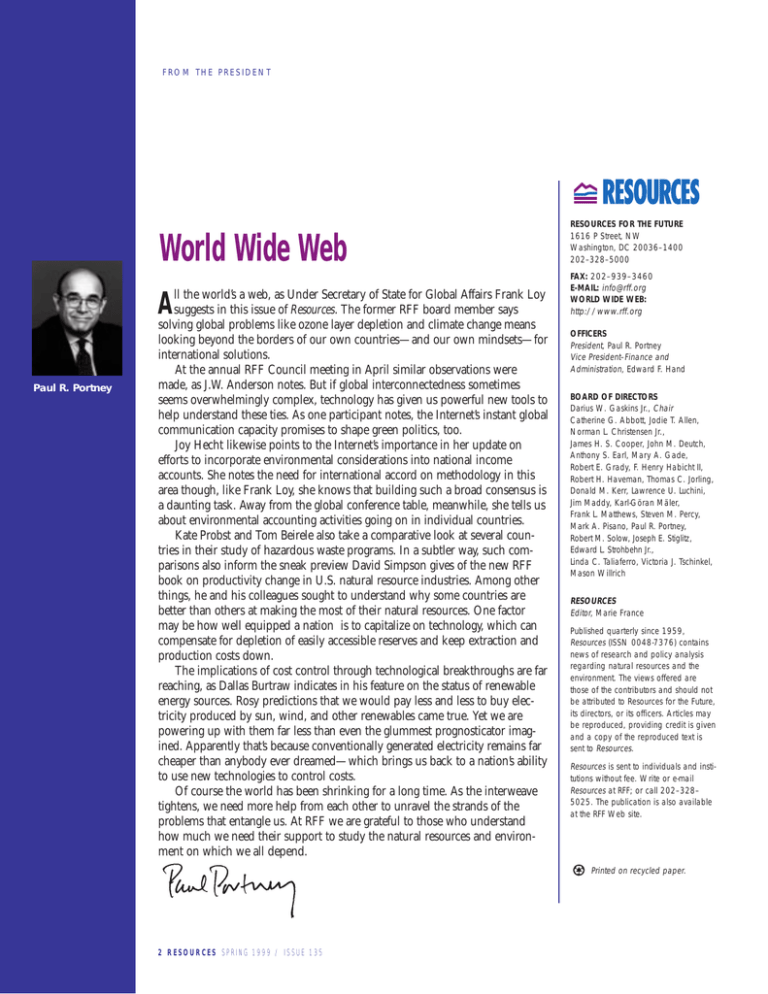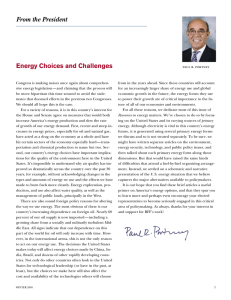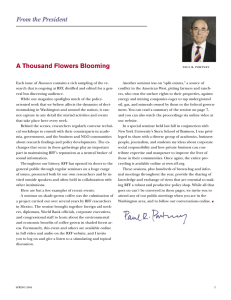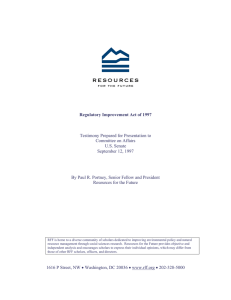A
advertisement

FROM THE PRESIDENT World Wide Web ll the world’s a web, as Under Secretary of State for Global Affairs Frank Loy A suggests in this issue of Resources. The former RFF board member says solving global problems like ozone layer depletion and climate change means Paul R. Portney looking beyond the borders of our own countries—and our own mindsets—for international solutions. At the annual RFF Council meeting in April similar observations were made, as J.W. Anderson notes. But if global interconnectedness sometimes seems overwhelmingly complex, technology has given us powerful new tools to help understand these ties. As one participant notes, the Internet’s instant global communication capacity promises to shape green politics, too. Joy Hecht likewise points to the Internet’s importance in her update on efforts to incorporate environmental considerations into national income accounts. She notes the need for international accord on methodology in this area though, like Frank Loy, she knows that building such a broad consensus is a daunting task. Away from the global conference table, meanwhile, she tells us about environmental accounting activities going on in individual countries. Kate Probst and Tom Beirele also take a comparative look at several countries in their study of hazardous waste programs. In a subtler way, such comparisons also inform the sneak preview David Simpson gives of the new RFF book on productivity change in U.S. natural resource industries. Among other things, he and his colleagues sought to understand why some countries are better than others at making the most of their natural resources. One factor may be how well equipped a nation is to capitalize on technology, which can compensate for depletion of easily accessible reserves and keep extraction and production costs down. The implications of cost control through technological breakthroughs are far reaching, as Dallas Burtraw indicates in his feature on the status of renewable energy sources. Rosy predictions that we would pay less and less to buy electricity produced by sun, wind, and other renewables came true. Yet we are powering up with them far less than even the glummest prognosticator imagined. Apparently that’s because conventionally generated electricity remains far cheaper than anybody ever dreamed—which brings us back to a nation’s ability to use new technologies to control costs. Of course the world has been shrinking for a long time. As the interweave tightens, we need more help from each other to unravel the strands of the problems that entangle us. At RFF we are grateful to those who understand how much we need their support to study the natural resources and environment on which we all depend. RESOURCES FOR THE FUTURE 1616 P Street, NW Washington, DC 20036–1400 202–328–5000 FAX: 202–939–3460 E-MAIL: info@rff.org WORLD WIDE WEB: http://www.rff.org OFFICERS President, Paul R. Portney Vice President–Finance and Administration, Edward F. Hand BOARD OF DIRECTORS Darius W. Gaskins Jr., Chair Catherine G. Abbott, Jodie T. Allen, Norman L. Christensen Jr., James H. S. Cooper, John M. Deutch, Anthony S. Earl, Mary A. Gade, Robert E. Grady, F. Henry Habicht II, Robert H. Haveman, Thomas C. Jorling, Donald M. Kerr, Lawrence U. Luchini, Jim Maddy, Karl-Göran Mäler, Frank L. Matthews, Steven M. Percy, Mark A. Pisano, Paul R. Portney, Robert M. Solow, Joseph E. Stiglitz, Edward L. Strohbehn Jr., Linda C. Taliaferro, Victoria J. Tschinkel, Mason Willrich RESOURCES Editor, Marie France Published quarterly since 1959, Resources (ISSN 0048-7376) contains news of research and policy analysis regarding natural resources and the environment. The views offered are those of the contributors and should not be attributed to Resources for the Future, its directors, or its officers. Articles may be reproduced, providing credit is given and a copy of the reproduced text is sent to Resources. Resources is sent to individuals and institutions without fee. Write or e-mail Resources at RFF; or call 202–328– 5025. The publication is also available at the RFF Web site. Printed on recycled paper. 2 RESOURCES SPRING 1999 / ISSUE 135






